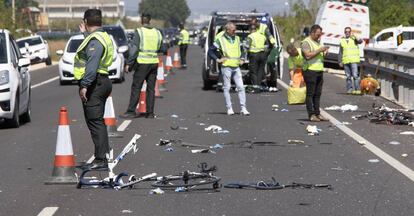Cyclists on Spanish roads
The Spanish authorities need to take measures to stop dangerous drivers getting behind the wheel

The incident at the weekend that saw a car plow into a group of cyclists in Oliva, Valencia, and which left three dead and two more seriously injured, is not just another road accident. The fact that the driver of the vehicle was both drunk and under the influence of drugs brings a greater seriousness to the incident. And even more so given that in 2013, the woman lost her license for similar offenses.
There is no doubt that a driver under the effect of drugs or alcohol represents a potentially explosive situation: reflexes are slowed, attention can wander and perception of risk is reduced. All of these factors multiply the dangers of those who get behind the wheel, turning them into a potentially lethal weapon, as has unfortunately just been seen in Valencia.
What is needed are measures that will prevent drivers who present risks from being on the roads in the first place
By their very nature, cyclists are the most fragile road users. Last year a total of 33 riders died on Spanish highways, and Spain’s DGT traffic authority has recorded more than 400 people killed on urban or intercity routes in the last decade. The rise in the number of people who are taking to cycling – whether for purely sporting reasons or as a regular means of transport – has seen the percentage of accidents involving cyclists go up. In 2015, there were 2,000 such incidents, double the number seen seven years’ previously.
Reducing the accident rate requires a rigorous compliance with road safety rules. Spanish authorities must ensure that the country’s roads are properly maintained and that the necessary signage is in place. But what is also needed are measures that will prevent drivers who present risks from being on the roads in the first place. Along with awareness campaigns and advertisements, the punishment for those who are caught at the wheel after drinking or taking drugs needs to be toughened.
English edition by Simon Hunter.
Tu suscripción se está usando en otro dispositivo
¿Quieres añadir otro usuario a tu suscripción?
Si continúas leyendo en este dispositivo, no se podrá leer en el otro.
FlechaTu suscripción se está usando en otro dispositivo y solo puedes acceder a EL PAÍS desde un dispositivo a la vez.
Si quieres compartir tu cuenta, cambia tu suscripción a la modalidad Premium, así podrás añadir otro usuario. Cada uno accederá con su propia cuenta de email, lo que os permitirá personalizar vuestra experiencia en EL PAÍS.
¿Tienes una suscripción de empresa? Accede aquí para contratar más cuentas.
En el caso de no saber quién está usando tu cuenta, te recomendamos cambiar tu contraseña aquí.
Si decides continuar compartiendo tu cuenta, este mensaje se mostrará en tu dispositivo y en el de la otra persona que está usando tu cuenta de forma indefinida, afectando a tu experiencia de lectura. Puedes consultar aquí los términos y condiciones de la suscripción digital.








































